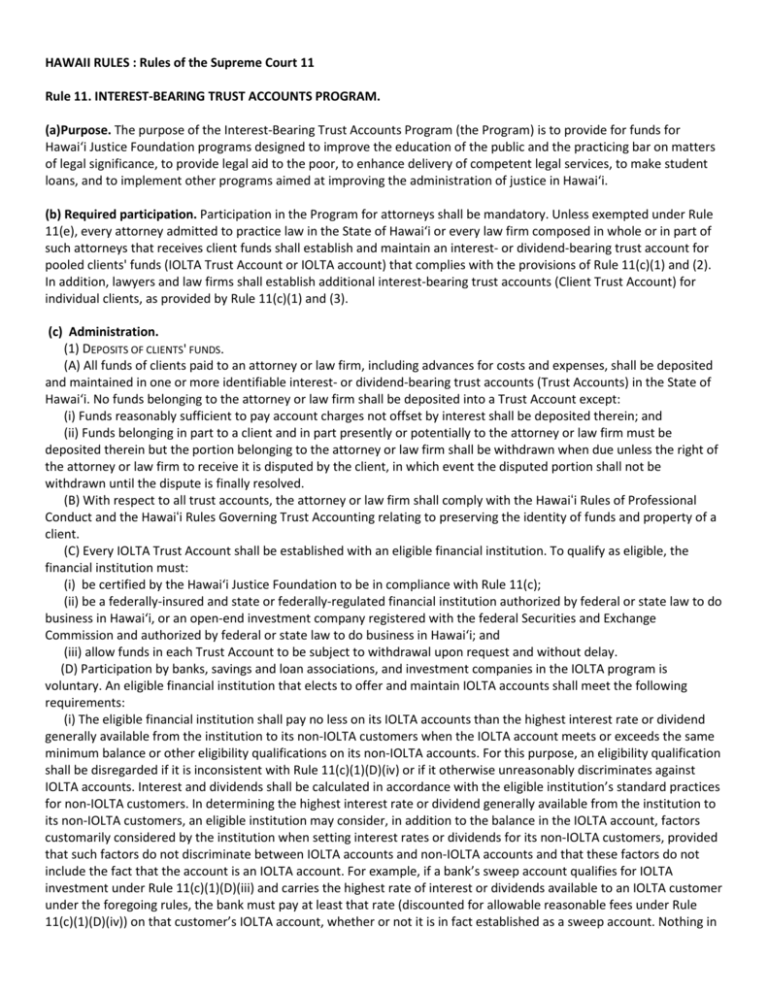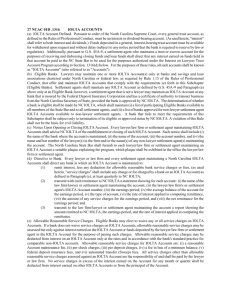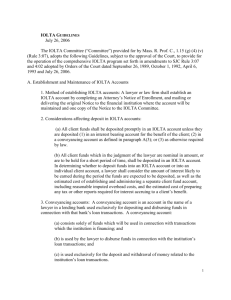Client Trust Account - Hawaii State Bar Association
advertisement

HAWAII RULES : Rules of the Supreme Court 11 Rule 11. INTEREST-BEARING TRUST ACCOUNTS PROGRAM. (a)Purpose. The purpose of the Interest-Bearing Trust Accounts Program (the Program) is to provide for funds for Hawai‘i Justice Foundation programs designed to improve the education of the public and the practicing bar on matters of legal significance, to provide legal aid to the poor, to enhance delivery of competent legal services, to make student loans, and to implement other programs aimed at improving the administration of justice in Hawai‘i. (b) Required participation. Participation in the Program for attorneys shall be mandatory. Unless exempted under Rule 11(e), every attorney admitted to practice law in the State of Hawai‘i or every law firm composed in whole or in part of such attorneys that receives client funds shall establish and maintain an interest- or dividend-bearing trust account for pooled clients' funds (IOLTA Trust Account or IOLTA account) that complies with the provisions of Rule 11(c)(1) and (2). In addition, lawyers and law firms shall establish additional interest-bearing trust accounts (Client Trust Account) for individual clients, as provided by Rule 11(c)(1) and (3). (c) Administration. (1) DEPOSITS OF CLIENTS' FUNDS. (A) All funds of clients paid to an attorney or law firm, including advances for costs and expenses, shall be deposited and maintained in one or more identifiable interest- or dividend-bearing trust accounts (Trust Accounts) in the State of Hawai‘i. No funds belonging to the attorney or law firm shall be deposited into a Trust Account except: (i) Funds reasonably sufficient to pay account charges not offset by interest shall be deposited therein; and (ii) Funds belonging in part to a client and in part presently or potentially to the attorney or law firm must be deposited therein but the portion belonging to the attorney or law firm shall be withdrawn when due unless the right of the attorney or law firm to receive it is disputed by the client, in which event the disputed portion shall not be withdrawn until the dispute is finally resolved. (B) With respect to all trust accounts, the attorney or law firm shall comply with the Hawaiʻi Rules of Professional Conduct and the Hawaiʻi Rules Governing Trust Accounting relating to preserving the identity of funds and property of a client. (C) Every IOLTA Trust Account shall be established with an eligible financial institution. To qualify as eligible, the financial institution must: (i) be certified by the Hawai‘i Justice Foundation to be in compliance with Rule 11(c); (ii) be a federally-insured and state or federally-regulated financial institution authorized by federal or state law to do business in Hawai‘i, or an open-end investment company registered with the federal Securities and Exchange Commission and authorized by federal or state law to do business in Hawai‘i; and (iii) allow funds in each Trust Account to be subject to withdrawal upon request and without delay. (D) Participation by banks, savings and loan associations, and investment companies in the IOLTA program is voluntary. An eligible financial institution that elects to offer and maintain IOLTA accounts shall meet the following requirements: (i) The eligible financial institution shall pay no less on its IOLTA accounts than the highest interest rate or dividend generally available from the institution to its non-IOLTA customers when the IOLTA account meets or exceeds the same minimum balance or other eligibility qualifications on its non-IOLTA accounts. For this purpose, an eligibility qualification shall be disregarded if it is inconsistent with Rule 11(c)(1)(D)(iv) or if it otherwise unreasonably discriminates against IOLTA accounts. Interest and dividends shall be calculated in accordance with the eligible institution’s standard practices for non-IOLTA customers. In determining the highest interest rate or dividend generally available from the institution to its non-IOLTA customers, an eligible institution may consider, in addition to the balance in the IOLTA account, factors customarily considered by the institution when setting interest rates or dividends for its non-IOLTA customers, provided that such factors do not discriminate between IOLTA accounts and non-IOLTA accounts and that these factors do not include the fact that the account is an IOLTA account. For example, if a bank’s sweep account qualifies for IOLTA investment under Rule 11(c)(1)(D)(iii) and carries the highest rate of interest or dividends available to an IOLTA customer under the foregoing rules, the bank must pay at least that rate (discounted for allowable reasonable fees under Rule 11(c)(1)(D)(iv)) on that customer’s IOLTA account, whether or not it is in fact established as a sweep account. Nothing in this rule shall preclude an eligible institution from paying a higher interest rate or dividend than described above or electing to waive any fees and service charges on an IOLTA account. (ii) An eligible institution may choose to pay the highest interest or dividend rate in Rule 11(c)(1)(D)(i), less allowable reasonable fees as set forth in Rule 11(c)(1)(D)(iv), if any, on an IOLTA account in lieu of establishing it as a higher rate product. (iii) The IOLTA Trust Account shall be an interest- or dividend-bearing account. Interest- or dividend-bearing account means: (a) an interest-bearing checking account; (b) a checking account paying preferred interest rates, such as money market or indexed rates; (c) a government interest-bearing checking account such as accounts used for municipal deposits; (d) a business checking account with an automated investment sweep feature which is a daily (overnight) financial repurchase agreement or an open-end money market fund; or (e) any other suitable interest-bearing deposit account offered by the institution to its non-IOLTA customers. A daily financial institution repurchase agreement must be fully collateralized by securities, of which at least 80% shall be U.S. Government Securities, and may be established only with an eligible institution that is well-capitalized or adequately capitalized as those terms are defined by applicable federal statutes and regulations. An open-end money-market fund must be comprised of at least 80% U.S. Government Securities, (or repurchase agreements fully collateralized by securities, of which at least 80% shall be U.S Government Securities), must hold itself out as a money-market fund as that term is defined by federal statutes and regulations under the Investment Company Act of 1940, and, at the time of the investment, must have total assets of at least $250,000,000. United States Government Securities are defined to include debt securities of Government Sponsored Enterprises, such as, but not limited to, securities of, or backed by, the Federal National Mortgage Association, the Government National Mortgage Association, and the Federal Home Loan Mortgage Corporation. (iv) Allowable reasonable fees are the only fees and service charges that may be deducted by an eligible institution from interest earned on an IOLTA account. Allowable reasonable fees are defined as per check charges, per deposit charges, a fee in lieu of minimum balances, sweep fees, FDIC insurance fees, and a reasonable IOLTA account administrative fee. Allowable reasonable fees may be deducted from interest or dividends on an IOLTA account only at the rates and in accordance with the customary practices of the eligible institution for non-IOLTA customers. No fees or service charges other than allowable reasonable fees may be assessed against the accrued interest or dividends on an IOLTA account. No fees or service charges shall be collected from the principal balance deposited in an IOLTA account. Any fees and service charges other than allowable reasonable fees shall be the sole responsibility of, and may only be charged to, the lawyer or law firm maintaining the IOLTA account, including bank overdraft fees and fees for checks returned for insufficient funds. Fees and service charges in excess of the interest or dividends earned on one IOLTA account for any period shall not be taken from interest or dividends earned on any other IOLTA account or accounts or from the principal of any IOLTA account. (v) As an alternative to the rates required under Rule 11(c)(1)(D)(i), an eligible institution may choose to pay on IOLTA accounts a safe harbor net yield rate that is initially set to be equal to 70% of the Federal Funds Target Rate as reported in the Wall Street Journal on the first calendar day of the month. This initial safe harbor rate of 70% of the Federal Funds Target Rate may be adjusted once a year by the Foundation, upon 90 days’ written notice to financial institutions participating in the IOLTA program. The safe harbor rate amount is net of all allowable reasonable fees under Rule 11(c)(1)(D)(iv). (E) Every Trust Account shall stand in the name of the lawyer or law firm and shall be clearly labeled and designated as either an IOLTA Trust Account or a Client's Trust Account established under this rule. (F) The financial institution shall notify the Office of Disciplinary Counsel directly of any overdraft on a Trust Account or of any check drawn on a Trust Account that is declined for non-sufficient funds. (2) IOLTA TRUST ACCOUNTS. Every IOLTA Trust Account shall comply with the following provisions: (A) The financial institution in which the IOLTA Trust Account is established shall be directed and required by the attorney or law firm: (i) to remit monthly all interest or dividends, as the case may be, on the account’s average daily balance in the IOLTA Trust Account, or as otherwise computed in accordance with the institution's standard accounting practice, less allowable reasonable fees as set forth in Rule 11(c)(1)(D)(iv), if any, charged against the account, to the Hawai‘i Justice Foundation; (ii) to transmit monthly to the Hawai‘i Justice Foundation, in an electronic format to be specified by the Hawai‘i Justice Foundation, a report containing the name of the lawyer or law firm for whom the remittance is sent, the account number, the amount of remittance attributable to each IOLTA account, the period for which remittance is made, the average daily balance in the IOLTA Trust Account, the rate of interest applied, the total amount of interest earned, the allowable reasonable fees as set forth in Rule 11(c)(1)(D)(iv), assessed against the account, if any, the net amount of interest remitted, and such other information as is reasonably required by the Hawai‘i Justice Foundation; and (iii) to transmit monthly to the depositing lawyer or law firm a report in accordance with the normal procedures for reporting to its depositors. (B) The attorney or law firm shall deposit no clients' funds in an IOLTA Trust Account unless such funds are either nominal in amount or to be held for a short period of time such that the funds cannot earn income in excess of the costs to secure that income. Funds of different clients may be commingled in an IOLTA Trust Account. (C) The attorney or law firm shall maintain as an IOLTA Trust Account all clients' funds that are either nominal in amount or to be held for a short period of time. (D) No client may (i) individually elect whether the client's funds should be deposited in an IOLTA Trust Account, (ii) receive interest or dividends earned on funds in an IOLTA Trust Account, or (iii) compel an attorney or law firm to invest funds that are either nominal in amount or to be held for a short period of time in a Client Trust Account. (E) The determination of whether a client's funds are nominal in amount or to be held for a short period of time rests exclusively in the sound judgment of each attorney or law firm. No charge of ethical impropriety or other breach of professional conduct shall result from an attorney's exercise of good faith judgment in that regard. (F) In determining when a client's funds are to be deposited in an IOLTA Trust Account, a lawyer or law firm may be guided by the following considerations: (i) The amount of interest which the funds would earn during the period they are expected to be deposited; (ii) The cost of establishing and administering the account, including the cost of the lawyer or law firm's services, accounting fees, and tax reporting requirements; (iii) The amount of funds involved, the period of time such funds are expected to be held, and the financial institution's minimum balance requirements and service charges; (iv) The capability of the financial institution to calculate and pay interest to individual clients; and (v) The likelihood of delay in the relevant transaction or proceeding. (G) The Hawai‘i Justice Foundation shall make available to attorneys, at least annually, a list of all financial institutions that offer IOLTA accounts and have been certified as eligible institutions by the Hawai‘i Justice Foundation under Rule 11(c)(1)(C)(i) as meeting the qualifying requirements under this rule as an IOLTA depository. Lawyers and/or law firms shall be entitled to rely on the most recently published list for purposes of compliance with Rule 11(c)(1)(C), (D), and (F), and Rule 11(c)(2)(A). Prior to its removing any financial institution from the list of certified financial institutions, the Hawai‘i Justice Foundation shall first provide the institution with notice of the corrective action needed to maintain its eligibility certification and shall provide the institution with sufficient time to reach compliance. In the event any financial institution is to be removed from the list of certified financial institutions, the Hawai‘i Justice Foundation shall give attorneys sufficient notice and time in order to move their IOLTA accounts to another certified financial institution. (H) Confidentiality. The Hawai‘i Justice Foundation shall protect the confidentiality of information regarding Trust Accounts pursuant to this rule. (3) NON-IOLTA CLIENT TRUST ACCOUNTS. All client funds shall be deposited in an IOLTA Trust Account specified in Rule 11(c)(2), unless the lawyer or law firm deposits them in a separate interest-bearing account for a particular client or client's matter, on which the interest, net of any service or other charges or fees imposed by the financial institution in connection with the account, will be paid to the client. Interest so earned must be held in trust as the property of each client in the same manner as is provided in this rule for the principal funds of the client. (d) Use of funds derived from IOLTA trust accounts. The net earnings derived from funds of a client deposited in an IOLTA Trust Account shall be used to pay for the following programs of the Hawai‘i Justice Foundation: (1) improve the administration of justice, including but not limited to means such as the following: (A) provide continuing legal education; (B) provide legal education to laypersons; (C) supply legal aid to the poor; (D) provide for competent delivery of legal services to those who are eligible therefor; and (E) provide aid to law reform projects. (2) provide student loans; and (3) support other programs for the benefit of the public and specifically approved by the Hawai‘i Supreme Court. (e) Exemptions. An attorney or the law firm with which the attorney is associated may be exempt from the requirements of this rule if: (1) the nature of the attorney's or law firm's practice is such that the attorney or law firm never receives client funds that would require a Trust Account; (2) the attorney is engaged in the practice of law in another jurisdiction and not engaged in the practice of law in this state; (3) the attorney is a full-time judge, government attorney, military attorney, or inactive attorney; or (4) the Hawai‘i Justice Foundation's Board of Directors, on its own motion, has exempted the attorney or law firm from participation in the Program for a period of no more than 2 years when service charges on the attorney's or law firm's Trust Account equal or exceed any interest generated. (f) Attorney filings and records. (1) ATTORNEY FILINGS. Each attorney or law firm shall file, in conjunction with the annual Hawaiʻi State Bar registration process, a certificate of annual compliance with trust accounting procedures, as required by Rule 7 of the Hawaiʻi Rules Governing Trust Accounting, or a certification that the attorney or law firm is exempt from such a filing under Rule 11(e) of these Rules. The certification shall contain the name of the lawyer or law firm listed on the account, the trust account name, the trust account number, the financial institution’s name and address, and the attorney’s Bar number. Failure to provide the certification within the registration period may result in administrative suspension from the practice of law in this state in the manner provided in Rule 17(d)(4)(A) of these Rules until the attorney complies with the requirements of this Rule. No other accounting or record-keeping requirements with respect to trust accounts under this Program shall be imposed on attorneys other than the minimum requirements expressed in this Rule, Rule 1.15 of the Hawaiʻi Rules of Professional Conduct, and the Hawaiʻi Rules Governing Trust Accounting. All information in the certificate of annual compliance shall be provided electronically by the Hawaiʻi State Bar to the Hawaiʻi Justice Foundation and the Office of Disciplinary Counsel, and shall be kept confidential. (2) RECORDS. An attorney or law firm shall preserve or cause to be preserved the records of all financial depository institution accounts or other records pertaining to the funds of a client maintained by the attorney or law firm in compliance with this Rule and Rule 4 of the Hawaiʻi Rules Governing Trust Accounting for a period of not less than 6 years subsequent to the completion of the employment to which they relate or the last transaction on the account, whichever comes last. Failure to file the required certificate, filing of a trust account certificate showing non-compliance with either this Rule or Rule 4 of the Hawaiʻi Rules Governing Trust Accounting, or return of a trust account check for insufficient funds shall be good cause for the Office of Disciplinary Counsel to undertake an investigation and pursue disciplinary action, if appropriate, against the attorney or law firm. (g) Rules and Policies of the Hawaiʻi Justice Foundation. To effectuate reporting by financial institutions of required trust account information, and to ensure the timely payment of the interest earned on IOLTA accounts to the Foundation, the Hawaiʻi Justice Foundation shall have authority to promulgate its own rules and policies consistent with this Rule, subject to the approval of the supreme court. (h) Implementation. Implementation will be effected through the application of this Rule by the Hawaiʻi State Bar, as overseen and approved by the supreme court. (Added September 22, 1983, effective September 22, 1983; renumbered September 1984; amended October 27, 1989, effective November 1, 1989, subject to transitional orders; amended May 15, 1991, effective July 1, 1991; further amended December 6, 1993, effective January 1, 1994; further amended June 16, 2008, effective July 1, 2008; further amended June 25, 2008, effective July 1, 2008; further amended October 21, 2013, effective January 1, 2014.)







